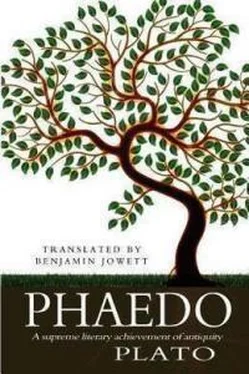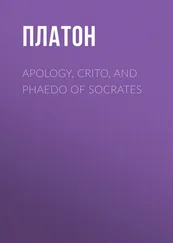Платон - Phaedo
Здесь есть возможность читать онлайн «Платон - Phaedo» весь текст электронной книги совершенно бесплатно (целиком полную версию без сокращений). В некоторых случаях можно слушать аудио, скачать через торрент в формате fb2 и присутствует краткое содержание. Год выпуска: 2014, Издательство: epubBooks Classics, Жанр: Философия, на английском языке. Описание произведения, (предисловие) а так же отзывы посетителей доступны на портале библиотеки ЛибКат.
- Название:Phaedo
- Автор:
- Издательство:epubBooks Classics
- Жанр:
- Год:2014
- ISBN:нет данных
- Рейтинг книги:3 / 5. Голосов: 1
-
Избранное:Добавить в избранное
- Отзывы:
-
Ваша оценка:
- 60
- 1
- 2
- 3
- 4
- 5
Phaedo: краткое содержание, описание и аннотация
Предлагаем к чтению аннотацию, описание, краткое содержание или предисловие (зависит от того, что написал сам автор книги «Phaedo»). Если вы не нашли необходимую информацию о книге — напишите в комментариях, мы постараемся отыскать её.
Phaedo — читать онлайн бесплатно полную книгу (весь текст) целиком
Ниже представлен текст книги, разбитый по страницам. Система сохранения места последней прочитанной страницы, позволяет с удобством читать онлайн бесплатно книгу «Phaedo», без необходимости каждый раз заново искать на чём Вы остановились. Поставьте закладку, и сможете в любой момент перейти на страницу, на которой закончили чтение.
Интервал:
Закладка:
Certainly, replied Cebes.
Then, if we look at the matter thus, there may be reason in saying that a man should wait, and not take his own life until God summons him, as he is now summoning me.
Yes, Socrates, said Cebes, there seems to be truth in what you say. And yet how can you reconcile this seemingly true belief that God is our guardian and we his possessions, with the willingness to die which we were just now attributing to the philosopher? That the wisest of men should be willing to leave a service in which they are ruled by the gods who are the best of rulers, is not reasonable; for surely no wise man thinks that when set at liberty he can take better care of himself than the gods take of him. A fool may perhaps think so—he may argue that he had better run away from his master, not considering that his duty is to remain to the end, and not to run away from the good, and that there would be no sense in his running away. The wise man will want to be ever with him who is better than himself. Now this, Socrates, is the reverse of what was just now said; for upon this view the wise man should sorrow and the fool rejoice at passing out of life.
The earnestness of Cebes seemed to please Socrates. Here, said he, turning to us, is a man who is always inquiring, and is not so easily convinced by the first thing which he hears.
And certainly, added Simmias, the objection which he is now making does appear to me to have some force. For what can be the meaning of a truly wise man wanting to fly away and lightly leave a master who is better than himself? And I rather imagine that Cebes is referring to you; he thinks that you are too ready to leave us, and too ready to leave the gods whom you acknowledge to be our good masters.
Yes, replied Socrates; there is reason in what you say. And so you think that I ought to answer your indictment as if I were in a court?
We should like you to do so, said Simmias.
Then I must try to make a more successful defence before you than I did when before the judges. For I am quite ready to admit, Simmias and Cebes, that I ought to be grieved at death, if I were not persuaded in the first place that I am going to other gods who are wise and good (of which I am as certain as I can be of any such matters), and secondly (though I am not so sure of this last) to men departed, better than those whom I leave behind; and therefore I do not grieve as I might have done, for I have good hope that there is yet something remaining for the dead, and as has been said of old, some far better thing for the good than for the evil.
But do you mean to take away your thoughts with you, Socrates? said Simmias. Will you not impart them to us?—for they are a benefit in which we too are entitled to share. Moreover, if you succeed in convincing us, that will be an answer to the charge against yourself.
I will do my best, replied Socrates. But you must first let me hear what Crito wants; he has long been wishing to say something to me.
Only this, Socrates, replied Crito:—the attendant who is to give you the poison has been telling me, and he wants me to tell you, that you are not to talk much, talking, he says, increases heat, and this is apt to interfere with the action of the poison; persons who excite themselves are sometimes obliged to take a second or even a third dose.
Then, said Socrates, let him mind his business and be prepared to give the poison twice or even thrice if necessary; that is all.
I knew quite well what you would say, replied Crito; but I was obliged to satisfy him.
Never mind him, he said.
And now, O my judges, I desire to prove to you that the real philosopher has reason to be of good cheer when he is about to die, and that after death he may hope to obtain the greatest good in the other world. And how this may be, Simmias and Cebes, I will endeavour to explain. For I deem that the true votary of philosophy is likely to be misunderstood by other men; they do not perceive that he is always pursuing death and dying; and if this be so, and he has had the desire of death all his life long, why when his time comes should he repine at that which he has been always pursuing and desiring?
Simmias said laughingly: Though not in a laughing humour, you have made me laugh, Socrates; for I cannot help thinking that the many when they hear your words will say how truly you have described philosophers, and our people at home will likewise say that the life which philosophers desire is in reality death, and that they have found them out to be deserving of the death which they desire.
And they are right, Simmias, in thinking so, with the exception of the words 'they have found them out'; for they have not found out either what is the nature of that death which the true philosopher deserves, or how he deserves or desires death. But enough of them:—let us discuss the matter among ourselves: Do we believe that there is such a thing as death?
To be sure, replied Simmias.
Is it not the separation of soul and body? And to be dead is the completion of this; when the soul exists in herself, and is released from the body and the body is released from the soul, what is this but death?
Just so, he replied.
There is another question, which will probably throw light on our present inquiry if you and I can agree about it:—Ought the philosopher to care about the pleasures—if they are to be called pleasures—of eating and drinking?
Certainly not, answered Simmias.
And what about the pleasures of love—should he care for them?
By no means.
And will he think much of the other ways of indulging the body, for example, the acquisition of costly raiment, or sandals, or other adornments of the body? Instead of caring about them, does he not rather despise anything more than nature needs? What do you say?
I should say that the true philosopher would despise them.
Would you not say that he is entirely concerned with the soul and not with the body? He would like, as far as he can, to get away from the body and to turn to the soul.
Quite true.
In matters of this sort philosophers, above all other men, may be observed in every sort of way to dissever the soul from the communion of the body.
Very true.
Whereas, Simmias, the rest of the world are of opinion that to him who has no sense of pleasure and no part in bodily pleasure, life is not worth having; and that he who is indifferent about them is as good as dead.
That is also true.
What again shall we say of the actual acquirement of knowledge?—is the body, if invited to share in the enquiry, a hinderer or a helper? I mean to say, have sight and hearing any truth in them? Are they not, as the poets are always telling us, inaccurate witnesses? and yet, if even they are inaccurate and indistinct, what is to be said of the other senses?—for you will allow that they are the best of them?
Certainly, he replied.
Then when does the soul attain truth?—for in attempting to consider anything in company with the body she is obviously deceived.
True.
Then must not true existence be revealed to her in thought, if at all?
Yes.
And thought is best when the mind is gathered into herself and none of these things trouble her—neither sounds nor sights nor pain nor any pleasure,—when she takes leave of the body, and has as little as possible to do with it, when she has no bodily sense or desire, but is aspiring after true being?
Certainly.
And in this the philosopher dishonours the body; his soul runs away from his body and desires to be alone and by herself?
That is true.
Well, but there is another thing, Simmias: Is there or is there not an absolute justice?
Assuredly there is.
And an absolute beauty and absolute good?
Of course.
But did you ever behold any of them with your eyes?
Читать дальшеИнтервал:
Закладка:
Похожие книги на «Phaedo»
Представляем Вашему вниманию похожие книги на «Phaedo» списком для выбора. Мы отобрали схожую по названию и смыслу литературу в надежде предоставить читателям больше вариантов отыскать новые, интересные, ещё непрочитанные произведения.
Обсуждение, отзывы о книге «Phaedo» и просто собственные мнения читателей. Оставьте ваши комментарии, напишите, что Вы думаете о произведении, его смысле или главных героях. Укажите что конкретно понравилось, а что нет, и почему Вы так считаете.










